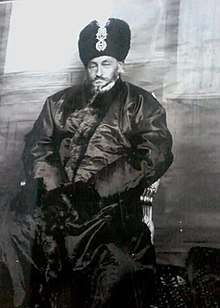Sayid Abdullah
Sayid Abdullah (1873–1933) was the last Khan of Khiva of the Khongirad (Qungrat) Dynasty, from 1 October 1918 until 1 February 1920. His father was Muhammad Rahim Bahadur, while his mother was of Lyuli origin. He had no real power, because the Khanate was ruled by Junaid Khan, a Turkmen general at that time. In 1920 the Bolsheviks had defeated Junaid Khan, overthrown the Khanate of Khiva and deposed Sayid Abdullah.[1] He was sent to Moscow where he died 13 years later at a hospital. His deposition in 1920 represents the end of the rule of Genghis Khan's direct descendants anywhere in the world.
| Sayid Abdullah | |
|---|---|
 | |
| Khan of Khiva | |
| Reign | 1918–1920 |
| Predecessor | Isfandiyar Khan |
| Successor | Monarchy Abolished by Red Army invasion. Territory taken over by the Soviet Union |
| Born | 1873 Khiva, Khiva Khanate (Present day Uzbekistan) |
| Died | 1933 Kryvyi Rih, Ukrainian SSR |
| Burial | Kryvyi Rih's Rudnichnoye cemetery |
| House | Khongirad (Uzbeks) |
| Father | Muhammad Rahim Khan II |
| Religion | Sunni Islam |
References
- Chahryar Adle:History of Civilizations of Central Asia volume VI, page 319
This article is issued from Wikipedia. The text is licensed under Creative Commons - Attribution - Sharealike. Additional terms may apply for the media files.